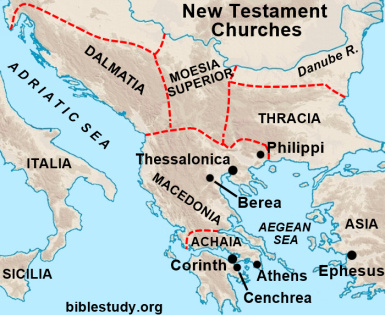Thessalonica (along with Corinth) were the two most important economic centers of all Greece. As a designated "free city" in the Roman Empire, it had no army garrison within its walls and benefitted from the privilege of striking its own coins.
The Apostle Paul evangelized the northern Greece city during his second and third journeys. His first visit to the city proved especially chaotic, as zealous Jews who heard him speak in the synagogue sought to combat the power and success of the gospel message.
Now some of them (in Thessalonica) were convinced, and joined themselves to Paul and Silas, including a great multitude of devout Greeks, and of the chief women not a few.
But the unbelieving Jews became envious and took to them certain evil men of the baser sort; and when they had gathered a huge crowd, they set the city in an uproar; and they assaulted the house of Jason, looking for Paul and Silas, to bring them out to the people . . . (Acts 17:4 - 5, HBFV).

The newly minted church brethren, realizing the situation in the city was a threat to the lives of both evangelists, immediately sent them away to Berea (Acts 17:10).
The Jews of the city, not content with chasing Paul and Silas out of their area, follow them to Berea to continue their persecution.
But when the Jews from Thessalonica learned that Paul was preaching the Word of God in Berea also, they came there to stir up the multitude. Then the brethren immediately sent Paul away, as if he were going to the sea; but both Silas and Timothy remained there (Acts 17:13 - 14).
A man named Jason, a Jewish Christian who was likely a blood relative of Paul (Romans 16:21), hosted believers in his home at Thessalonica (Acts 17:5 - 9).
But the unbelieving Jews became envious and took to them certain evil men of the baser sort; and when they had gathered a huge crowd, they set the city in an uproar; and they assaulted the house of Jason, looking for Paul and Silas, to bring them out to the people (Acts 17:5, HBFV).
The books of 1 and 2Thessalonians, penned by Paul from Corinth between 50 - 51 A.D., are noteworthy in that they are the first ones written by the apostle that are included in the Bible.